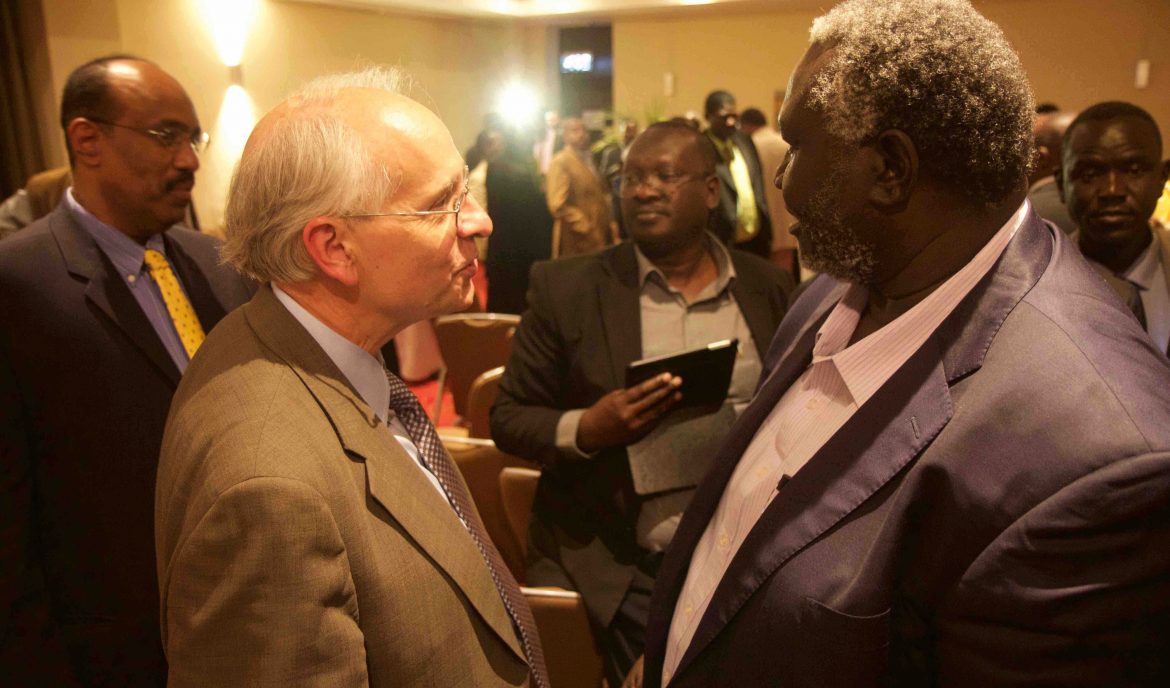SUDAN INSIDER |
This news summary is part of our Sudan Insider, a monthly newsletter providing
news and analysis on Sudan’s biggest stories.
Subscribe here to receive the Sudan Insider in your inbox.
…………………………………………………………………………………………………………..
US engages government and opposition to revive peace talks
What happened…
In late April, the US government held a series of meetings with government and opposition party officials as well as the rebel SPLM-N leadership and African Union-led chief negotiator Thabo Mbeki. The series of meetings were designed to revive the peace talks and further assess whether the US government will permanently lift economic sanctions against Sudan in July.
Several US agencies, including the State Department, are to present to US President Donald Trump before July 12 their recommendations as to whether 20-year sanctions will be lifted. Part of the criterion for this decision rests on a cessation of hostilities with rebel movements within the country. The US government is therefore attempting to revive African Union-brokered peace talks led by Mbeki, which collapsed last August.
The government and opposition alliance signed in March and August 2016 the AU-brokered Roadmap Agreement, a process document designed to pave the way for a comprehensive peaceful settlement between the warring parties.
The talks collapsed, however, over humanitarian access routes. The government seeks control over humanitarian aid routes and rejected the SPLM-N request to have 20% of humanitarian aid emanate through a humanitarian corridor from Asosa, an Ethiopian border town. Fearing government aid manipulation, the SPLM-N declined a November proposal by the US to monitor internal aid routes to the war-affected regions. The SPLM-N met the US envoy twice this month with suggested amendments to the US humanitarian access proposal, SPLM-N peace talks spokesman Mubarak Ardol said.
Both the government and SPLM-N have expressed their interest in resuming the talks, although SPLM-N Chairman Malik Agar requested Mbeki to postpone the peace talks until July in order for the SPLM-N to resolve internal rifts within the rebel movement. The internal dispute stems from the March resignation letter offered by Deputy Chairman Abdel-Aziz Hilu from the SPLM-N, citing differences between him and the executive leadership and the lack of institutional measures to develop the SPLM-N as a democratic, inclusive movement.
Agar also called on the US delegation to postpone their decision to lift sanctions for another six-month period, according to an SPLM-N statement. The SPLM-N request the US to link the sanctions lift to humanitarian issues, a comprehensive peace and democratic reforms, Ardol said.
What it means…
The US government views Sudan as a key counterterrorism partner and did not factor Khartoum’s human rights record in their decision to potentially lift sanctions. Sudan’s intelligence chief met with the CIA and FBI in March, and, according to Sudanese Intelligence General Hanafi Abdallah, Sudan hosts the largest CIA office in the Middle East. The US may not want to jeopardize this ostensibly strategic relationship and uphold sanctions against the ruling party.
Even the key US provision calling on Sudan to desist from hostilities in the conflict regions in order to permanently lift economic sanctions appears to be ignored. There has been no international outcry, for instance, over reports of the resumption of conflict in the Jebel Marra region of central Darfur on April 22, including claims of Sudan warplanes bombing villages.
The fact that SPLM-N Deputy Chairman Abdel-Aziz Hilu is not attending these talks with Mbeki and the US delegation suggests the internal disputes within the rebel movement are not resolved. One of the main contentions Hilu presented in his resignation letter was the lack of inclusivity vis-à-vis the peace talks, a position widely supported by the influential regional body, the Nuba Mountains Liberation Council in South Kordofan State. Any decisions made by the current SPLM-N leadership in relation to these discussions, therefore, may not be binding.
While the political impasse over the peace talks and the key issue of humanitarian access remains unresolved, both South Kordofan and Blue Nile face one of the worst food insecurity crises since the conflict begun in 2011. According to the South Kordofan-Blue Nile Coordination Unit, an organization that monitors food security and displacement in the two areas, over half the population in the Nuba Mountains faces food insecurity and is projected to worsen. Harvests in Blue Nile are slightly better, the Food Security Monitoring Unit reports, but an influx of refugees fleeing insecurity in Maban, Upper Nile State, has exasperated reserves.





